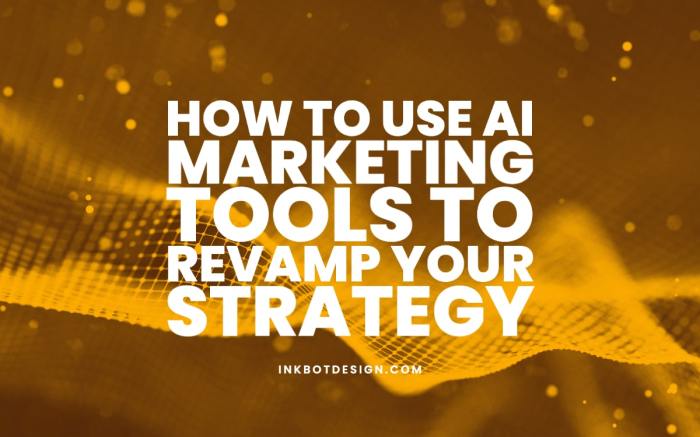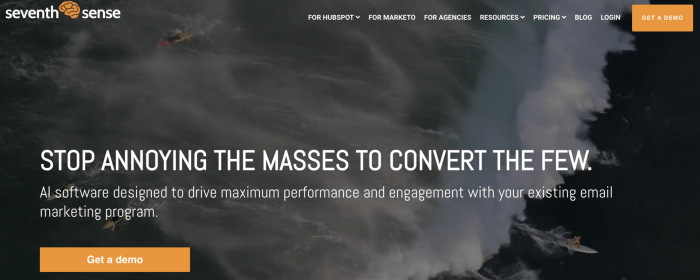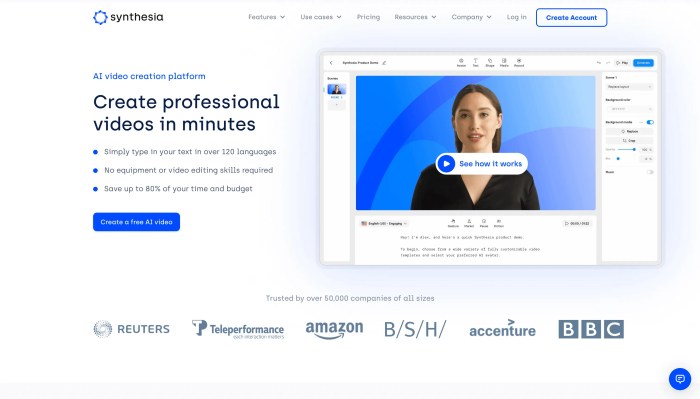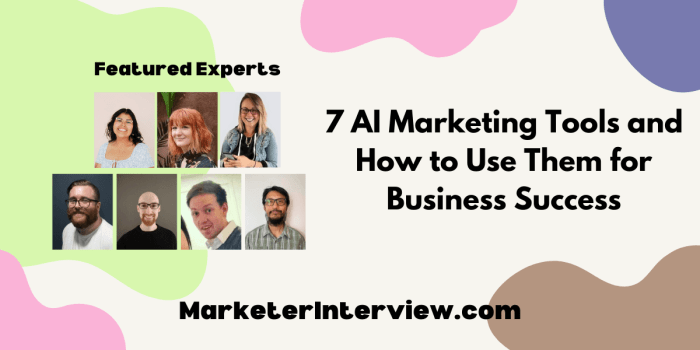How to Use AI Tools for Marketing That Work in 7 Tools offers marketing professionals a modern playbook to excel in their campaigns. In today’s fast-paced digital landscape, leveraging AI tools has become essential for optimizing marketing strategies and enhancing customer experiences. This guide will walk you through seven powerful AI tools that can transform your marketing efforts, from content creation to predictive analytics, ensuring you stay ahead of the competition.
As we dive into each tool, you’ll discover how these innovative technologies not only streamline your processes but also elevate your engagement strategies, making them a game-changer in your marketing toolkit.
Overview of AI Tools in Marketing
In today’s fast-paced digital landscape, integrating artificial intelligence (AI) tools into marketing strategies is no longer just an option but a necessity. These tools not only streamline various marketing processes but also enable marketers to make data-driven decisions that significantly enhance efficiency and effectiveness. By leveraging AI, businesses can better understand consumer behavior, personalize customer experiences, and ultimately drive higher conversion rates.AI tools in marketing come in a variety of forms, each designed to tackle specific challenges and improve overall strategy.
From customer relationship management (CRM) systems powered by AI, to content creation tools and predictive analytics, the options available to marketers are diverse and evolving rapidly. Utilizing these tools can provide insights that were previously unattainable, allowing businesses to engage their audiences in a more meaningful and targeted way.
Types of AI Tools Available for Marketers
The landscape of AI tools available for marketers is expansive, each serving distinct roles that contribute to a comprehensive marketing strategy. Understanding these tools is essential for marketers seeking to enhance their campaigns and improve customer interaction. Here are some of the primary categories of AI tools:
- Customer Relationship Management (CRM) Systems: AI-enhanced CRMs like Salesforce Einstein and HubSpot utilize machine learning to analyze customer data, predict needs, and personalize communication strategies.
- Content Creation Tools: Tools such as Jasper and Copy.ai employ natural language processing to generate high-quality content, reducing the time and effort required for content marketing.
- Chatbots and Virtual Assistants: AI-driven chatbots, like those offered by Drift or Intercom, provide real-time support and engagement, ensuring customers receive immediate responses to their inquiries.
- Predictive Analytics Tools: Platforms such as Google Analytics and IBM Watson Analytics analyze historical data to forecast future trends and behaviors, enabling marketers to plan more effectively.
- Social Media Management Tools: AI tools like Sprout Social and Hootsuite analyze social media interactions and sentiment, helping brands to optimize their social media strategies.
- Email Marketing Automation: Tools like Mailchimp and SendGrid use AI to segment audiences, personalize messages, and automate email campaigns for improved engagement.
AI tools not only enhance operational efficiency but also foster deeper connections with customers. By analyzing data patterns and preferences, businesses can tailor their marketing efforts, making them more relevant and engaging. For instance, AI-driven personalization in email marketing has been shown to increase open rates significantly, as campaigns can be customized based on individual consumer behavior and preferences.
AI tools empower marketers to not just react to market trends but to anticipate and prepare for them, fundamentally shifting the approach to customer engagement and conversion strategies.
Tool #1: Content Creation AI
With the rapid advancement of artificial intelligence, marketers can harness the power of AI tools to create high-quality content efficiently. Content Creation AI enables businesses to generate engaging articles, blog posts, social media updates, and more, helping to streamline the marketing process and maintain consistency across various platforms. By utilizing these tools, marketers can focus on strategy and execution while minimizing the time spent on content generation.AI tools specialized in content creation have been designed to assist marketers in producing written materials that resonate with their target audience.
Some notable examples include OpenAI’s Kami, Copy.ai, and Jasper. These platforms provide a range of features that allow users to generate creative ideas, Artikel structures, and even draft complete articles with just a few prompts. The ability to customize tone, style, and topics ensures that the generated content aligns with the overall marketing strategy.
Best Practices for Integrating AI-Generated Content into Marketing Campaigns
Integrating AI-generated content into marketing campaigns requires careful planning and execution to maximize effectiveness. Here are key practices to consider:
1. Define Clear Objectives
Establish what you want to achieve with the AI-generated content. This could be increasing brand awareness, driving traffic, or enhancing customer engagement.
2. Maintain Brand Voice
Ensure that the AI tool is trained or guided to produce content that reflects your brand’s unique voice and values. Consistency in messaging is crucial for brand recognition.
3. Edit and Curate
Though AI can generate content quickly, it’s essential to review and edit the output for accuracy, relevance, and tone. This step helps in maintaining quality and authenticity.
4. Incorporate Strategies
Leverage AI tools to optimize content for search engines. This includes using relevant s, meta descriptions, and appropriate formatting to improve visibility.
5. Monitor Performance
After deploying AI-generated content, track its performance across different channels. Utilize analytics to understand audience engagement, clicks, and conversions to refine future content strategies.
6. Encourage Interaction
Use AI-generated content as a springboard for audience interaction. Encourage users to comment, share, and provide feedback, creating a dialogue that enhances engagement.
7. Stay Updated
The landscape of AI tools is constantly evolving. Stay informed about new features, updates, and best practices to continually enhance your content marketing efforts.By following these best practices, marketers can effectively leverage AI-generated content to enhance their campaigns, engage their target audience, and drive business results. The synergy of creativity and technology paves the way for innovative marketing strategies that resonate with consumers in today’s fast-paced digital environment.
Tool #2: Social Media Management AI

Social media management can be time-consuming, but with the right AI tools, you can streamline tasks and enhance engagement efficiently. Social media is a powerful marketing tool, and utilizing AI can help manage it effectively, allowing businesses to focus on creating meaningful content and connecting with their audience.Numerous AI tools are designed to simplify social media management by automating repetitive tasks, scheduling posts, and providing analytics.
These tools help marketers optimize their strategies and ensure they are reaching their target audience effectively.
Social Media Automation and Engagement Tracking
AI tools can significantly enhance the automation of social media posting schedules and engagement tracking. By automating your posting schedule, you can ensure consistent content delivery without the hassle of manual posting. This is particularly important for maintaining an active social media presence, which can lead to increased followers and engagement.
- Tools like Buffer and Hootsuite allow you to schedule posts across multiple platforms in advance. This means you can dedicate time to strategizing your content rather than worrying about when to post.
- AI tools can analyze your audience’s behavior to suggest optimal posting times, maximizing the visibility of your content.
- Engagement tracking becomes effortless with AI. Tools like Sprout Social and Socialbakers provide insights into how your audience interacts with your posts, highlighting which content types resonate most.
Analyzing Social Media Metrics with AI Assistance
Understanding social media metrics is crucial for refining your marketing strategy. AI can simplify the analysis of large datasets and provide actionable insights that can drive your campaigns forward.Utilizing AI for metric analysis offers several benefits:
Automated Reporting
Tools like Google Analytics and HubSpot can provide automated reports, summarizing your social media performance over specified periods. This saves time and allows for quick adjustments to strategies based on data.
Sentiment Analysis
AI tools can analyze comments and interactions to gauge audience sentiment. Understanding whether feedback is positive or negative helps shape future content and engagement strategies.
Competitor Insights
Platforms like Brandwatch and Mention can track competitors’ social media activity, providing insights into their strategies and audience interactions, helping you identify opportunities for improvement.
“AI tools transform social media management from a daunting task into an efficient, data-driven process.”
By leveraging AI in social media management, businesses can create a more dynamic and effective marketing strategy that not only saves time but also nurtures customer relationships and drives engagement.
Email Marketing AI

In today’s digital landscape, email marketing remains one of the most effective channels for reaching customers. By integrating AI into email marketing strategies, businesses can enhance their campaigns with personalized content, increased engagement, and improved analytics. This powerful tool not only streamlines the process but also optimizes the overall customer experience.AI technology can significantly personalize email campaigns for different audiences.
By analyzing user behavior, preferences, and engagement patterns, AI tools can segment audiences more effectively than traditional methods. This capability allows marketers to tailor content that resonates with specific groups, leading to higher open and conversion rates.
Implementing AI in Email Marketing Strategies
Integrating AI into your email marketing strategy involves several key steps that can elevate your campaigns. By focusing on these elements, businesses can create more targeted and impactful email communications:
1. Data Collection and Analysis
Gather data on customer interactions and preferences through email engagement metrics. AI analyzes this data to identify trends and segment audiences effectively.
2. Dynamic Content Creation
Utilize AI-driven tools to create personalized content based on user data. This includes dynamic subject lines, tailored recommendations, and customized visuals that adapt to individual preferences.
3. Automated Sending
Implement AI algorithms to determine the optimal time for sending emails. These algorithms analyze user activity, ensuring emails reach recipients when they are most likely to engage.
4. Performance Monitoring
AI provides real-time analytics that track engagement metrics such as open rates, click-through rates, and conversions. This insight allows marketers to adjust their strategies based on performance data.
5. Predictive Analytics
Use AI to predict future customer behavior and preferences, allowing for proactive campaign adjustments. This feature can help identify potential churn risks and target those users with re-engagement strategies.Successful email marketing campaigns utilizing AI tools demonstrate the effectiveness of this approach. For instance, the fashion retailer ASOS employs AI to personalize product recommendations in their email campaigns. By analyzing customer browsing history and purchase behavior, ASOS tailored emails to include products that aligned with individual preferences, resulting in a significant increase in conversion rates.Another great example is the online streaming service Netflix, which leverages AI to optimize its email marketing by sending personalized viewing recommendations.
By analyzing viewing history and user ratings, Netflix crafts emails that showcase shows and movies that users are likely to enjoy, driving higher engagement and retention rates.Through effective implementation of AI in email marketing, businesses can expect a marked improvement in customer satisfaction and campaign performance.
Tool #4: Customer Insight and Analytics AI
In today’s competitive market, understanding your customers is crucial for tailoring your marketing strategies effectively. AI tools specifically designed for customer insight and analytics can sift through vast datasets to uncover intricate patterns in consumer behavior. By leveraging these technologies, businesses can gain a deeper understanding of their audience, allowing for more informed marketing decisions.AI plays a pivotal role in analyzing customer data by employing machine learning algorithms and predictive analytics.
These technologies can process large volumes of data from various sources, including social media, purchase history, and online interactions. The insights garnered from this analysis can help businesses identify trends, segment their audience, and personalize marketing efforts. For instance, AI can highlight which demographics are most likely to engage with specific campaigns, enabling targeted outreach that resonates with potential customers.
Methods for Gaining Actionable Insights
Utilizing AI for customer insights involves several methodologies that can enhance decision-making. Here are a few effective techniques:
- Predictive Analytics: This method anticipates future consumer behaviors based on historical data, helping businesses forecast trends and adjust strategies accordingly.
- Sentiment Analysis: By analyzing social media conversations and online reviews, AI tools can gauge public sentiment about a brand or product, offering valuable feedback for improving marketing strategies.
- Cluster Analysis: AI can segment customers into distinct groups based on shared characteristics, allowing for tailored marketing messages that speak directly to the interests and needs of each segment.
- Churn Prediction: This technique identifies customers at risk of leaving, enabling businesses to implement retention strategies before they lose valuable clients.
Several AI tools are available that assist in market research and consumer analysis. Tools like Google Analytics employ AI to provide insights into website traffic and user behavior, helping businesses understand how visitors interact with their content. Another example is IBM Watson, which offers powerful analytics capabilities, including natural language processing to analyze customer feedback. Additionally, platforms like Salesforce Einstein utilize machine learning to enhance customer relationship management by providing actionable insights based on data trends.A well-executed AI analysis strategy not only optimizes marketing efforts but can also lead to improved customer satisfaction and loyalty.
In a world where consumer preferences are continually evolving, leveraging AI for customer insights is no longer just an option; it’s a necessity for businesses aiming to thrive in the digital landscape.
Tool #5: Chatbots and Customer Support AI
As businesses strive to enhance their customer service experience, AI chatbots have emerged as a pivotal tool in this transformation. These virtual assistants not only provide instant support but also streamline interactions, making them a valuable asset in marketing strategies. By leveraging AI chatbots, companies can engage customers 24/7, handling inquiries efficiently and enhancing overall satisfaction.Designing and implementing AI chatbots involves several key steps that ensure effectiveness and user satisfaction.
It starts with identifying the specific needs of your customers and the types of inquiries they frequently make. Developers must Artikel clear conversation flows and incorporate natural language processing (NLP) to facilitate human-like interactions. Testing the chatbot with real users and continuously refining its responses based on feedback is crucial to maintaining its relevance and efficiency.
Examples of Effective Chatbot Interactions
When considering effective chatbot interactions, it’s essential to focus on how these AI tools can enhance customer engagement while providing valuable information. Here are a few notable examples of chatbot functionalities that have proven successful in marketing:
- Order Tracking: Chatbots can provide real-time updates on order statuses. For instance, a retail brand’s chatbot can inform customers when their items have shipped, estimated delivery times, and even assist with returns, all within a conversational interface.
- Personalized Recommendations: By analyzing user data and preferences, chatbots can offer tailored product suggestions. For example, an e-commerce platform could use a chatbot to ask customers about their interests and deliver personalized product choices accordingly.
- Appointment Scheduling: Many service-oriented businesses utilize chatbots to allow customers to book appointments seamlessly. A healthcare provider’s chatbot might assist patients in scheduling visits and sending reminders, streamlining the patient experience.
The benefits of using AI for enhancing customer service experience are substantial. Chatbots significantly reduce response times, ensuring that customers receive immediate assistance. They also help lower operational costs by handling multiple inquiries simultaneously, allowing human agents to focus on more complex issues. Furthermore, chatbots can operate around the clock, ensuring that customers worldwide have access to support whenever they need it.
“The integration of chatbots in customer service not only enhances efficiency but also fosters better customer relationships through consistent, personalized interactions.”
Tool #6: Optimization AI

In today’s digital landscape, where visibility is crucial for success, optimization is more important than ever. AI plays a significant role in enhancing content for search engines, allowing marketers to streamline efforts and achieve better rankings. Leveraging AI tools can help analyze vast amounts of data quickly, providing insights that would take humans hours or even days to gather.
This fast-tracked process enables marketers to implement effective strategies that drive organic traffic.AI in optimization is invaluable for tasks like research and audits, which are essential for ensuring that your content aligns with search engine algorithms. Utilizing AI means you can stay ahead in the competitive online space. Here are some notable tools that assist in research and audits:
Essential Tools for Optimization
Several powerful AI tools can enhance your efforts by providing suggestions, analyzing competitors, and conducting audits.
- Ahrefs: Known for its comprehensive research and competitive analysis, Ahrefs uses AI to process large datasets efficiently, helping marketers discover valuable s.
- SEMrush: This tool excels at offering insights and site audits, utilizing AI to analyze site performance and suggest necessary improvements.
- Moz: With a focus on domain authority and link building, Moz employs AI to provide insights into difficulty and search volume, guiding effective content creation.
- Surfer : Surfer integrates AI to analyze top-ranking pages and provide recommendations for on-page optimization based on data-driven insights.
Utilizing these tools will aid in developing a robust strategy that aligns with current trends and search engine algorithms.
Techniques for Improving Website Rankings
Implementing AI in goes beyond tools; it involves adopting techniques that enhance website rankings effectively. Here are some strategies that can be employed:
- Conduct regular audits using AI tools to identify and rectify issues that could hinder search engine rankings, such as broken links or slow loading speed.
- Utilize AI-driven analysis to identify high-traffic s and incorporate them naturally into your content to improve relevance and visibility.
- Leverage AI for content optimization by analyzing user engagement metrics to understand what resonates with your audience, then tailoring your content accordingly.
- Implement structured data markup using AI recommendations, which can help search engines better understand your content and improve visibility in search results.
The application of these techniques can significantly enhance your website’s performance, allowing you to achieve better rankings and drive more organic traffic.
Tool #7: Predictive Analytics AI

Predictive analytics AI is a powerful tool that uses historical data, statistical algorithms, and machine learning techniques to identify the likelihood of future outcomes based on past behaviors. By leveraging these technologies, marketers can forecast customer behavior, understand trends, and make informed decisions that enhance their marketing strategies. This tool is increasingly vital as businesses strive to personalize experiences and optimize their marketing efforts.Predictive analytics enables businesses to analyze patterns in data and predict future trends, which can significantly impact marketing campaigns.
Marketers can identify potential customers who are more likely to convert, tailor offerings based on predicted behaviors, and allocate resources more efficiently. By understanding customer journeys and expectations, brands can anticipate needs and adapt their strategies accordingly.
Examples of AI Tools for Predictive Modeling
Various AI tools specialize in predictive modeling, providing marketers with insights to shape their campaigns more effectively. Here are some noteworthy examples:
- Google Analytics: This widely-used platform offers predictive metrics that help businesses forecast user behavior, allowing them to tailor marketing strategies to align with expected customer actions.
- Salesforce Einstein: An AI-powered analytics tool that helps users predict customer behavior based on historical data, enabling personalized marketing efforts across different channels.
- IBM Watson: Known for its advanced analytics capabilities, Watson can analyze vast amounts of data to provide insights into customer trends and preferences, allowing marketers to make data-driven decisions.
- Microsoft Azure Machine Learning: This cloud-based platform allows businesses to build, train, and deploy predictive models, making it easier to forecast customer behaviors and tailor marketing efforts accordingly.
- Tableau: Tableau’s analytics solutions can integrate with predictive capabilities, visualizing data trends that inform marketing strategies and customer engagement efforts.
Leveraging predictive insights in marketing strategies allows companies to create more targeted, effective campaigns. By understanding potential future trends, businesses can:
- Optimize marketing budgets by investing in channels that show the highest predicted ROI.
- Develop personalized content and offers that resonate with customers based on their predicted behaviors.
- Enhance customer retention efforts by identifying at-risk customers and implementing tailored engagement strategies.
- Streamline product development processes by predicting market demand and aligning offerings with customer expectations.
Incorporating predictive analytics into marketing strategies not only improves campaign effectiveness but also builds stronger customer relationships by addressing needs before they arise. By using data-driven insights, marketers can stay ahead of trends and foster a responsive, agile marketing approach.
Closing Notes

In summary, the integration of AI tools into marketing strategies is no longer a luxury but a necessity for businesses looking to thrive. From personalizing email campaigns to optimizing and providing customer insights, these seven tools equip marketers with the resources needed to enhance engagement and drive conversions. Embracing these technologies will not only save time but also yield remarkable results, setting you up for sustained success in the evolving marketing landscape.